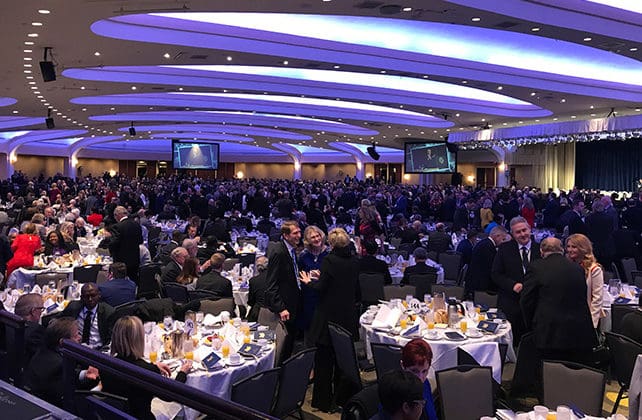
by Bob Smietana
(RNS) The National Prayer Breakfast will be a virtual event next year due to the ongoing COVID-19 pandemic.
The gathering has been held annually, usually on the first Thursday of February, for nearly seven decades and draws thousands of attendees from around the world.
The virtual 2021 breakfast will be streamed online, confirmed A. Larry Ross, a longtime evangelical public relations expert and friend of the Fellowship Foundation, the nonprofit that organizes the prayer breakfast.
Details of the event are still being finalized but there will be no large group gathering due to the pandemic.
Also known as the Family and the International Foundation, the Fellowship, with the help of members of Congress, has organized the prayer breakfast since 1953, when President Dwight Eisenhower spoke to about 400 politicians as well as business and religious leaders, including the Rev. Billy Graham.
Every president since then has spoken at the invitation-only event. It has often been one of the first major post-inauguration speeches given by a new president.
The Biden transition team could not confirm whether President-elect Joe Biden has been invited to speak. Biden, a Catholic, has attended the breakfast in the past.
President Donald Trump caused a stir during the 2020 prayer breakfast by holding up a copy of The Washington Post with the headline “Trump acquitted” at the event, referring to the Senate decision on his impeachment.
After Arthur Brooks, a Harvard professor and author, urged attendees at the 2020 breakfast to love their political enemies, Trump scoffed at the idea and criticized the “very corrupt and dishonest people” he claimed were behind his impeachment.
“I don’t like people who use faith for justification for doing what they know is wrong, nor do I like people who say ‘I pray for you’ when they know that is not so,” said Trump.
He also told Brooks he was trying to love his enemies.
The breakfast that year closed with a benediction from U.S. Rep. John Lewis, who was battling the cancer that would take his life five months later.
In his prayer, Lewis recalled how faith sustained him when he was beaten while crossing the Edmund Pettus Bridge in Selma, Alabama, in 1965 on a civil rights march.
“I never hated the people who beat me, because I chose the way of peace, the way of love, the way of nonviolence,” Lewis said.
He asked God to bring the country together.
“We must believe in one another,” Lewis said. “We must never give up on our fellow human beings.”
